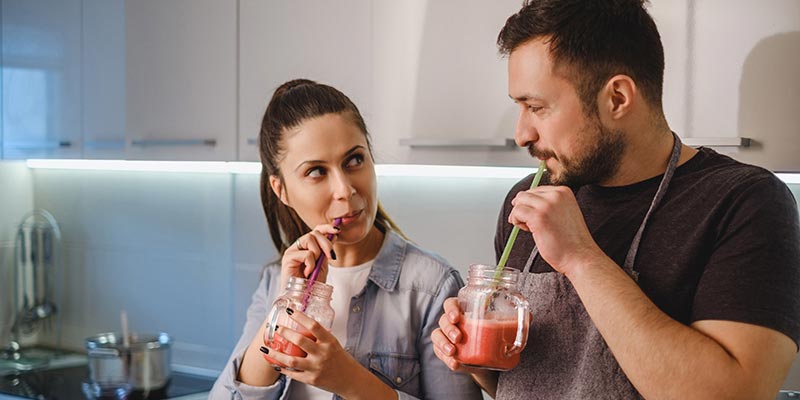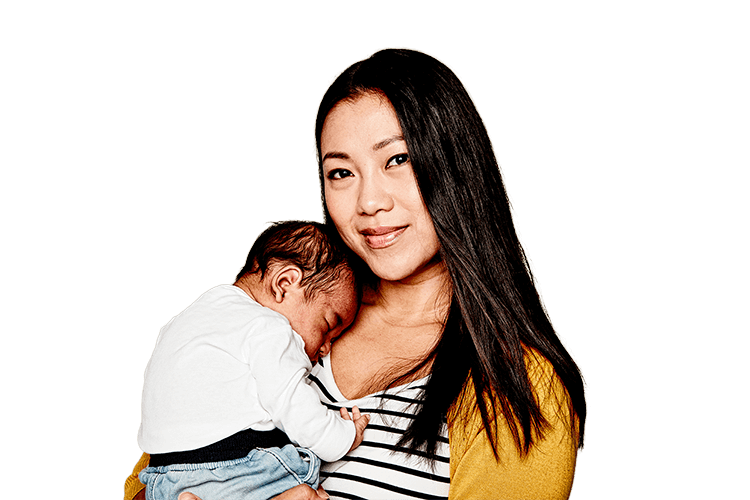Whether you’re thinking about a family in the future, or are close to making a decision about falling pregnant, you want to ensure you and your partner are in the best shape, fertility wise, as you can be.
Fertility is affected by a host of different issues: some, like age, you can’t change. But most are lifestyle factors – what you eat, your weight, how much your exercise, the kind of chemicals you’re exposed to, and substance use (that means cigarettes and alcohol to most of us).
Let’s take a closer look at the effect some of those have on your fertility, and why you may need to make lifestyle changes if you want to optimise your chance or falling pregnant.

Smoking
The chemicals in cigarettes may damage the DNA inside sperm, which may impact the health of your future children. Pregnant women who smoke are more likely to have miscarriages, premature births and babies with health complications.
The carcinogens and heavy metals in cigarettes are some of the agents that can cause sperm damage, including damage to the DNA in sperm. There’s evidence to suggest that this can cause both reduced fertility and a higher incidence of miscarriages.
On the plus side, research shows that for both men and women, the positive effects of stopping can be seen in just a few months. If you’re a man, experts suggest testing your sperm quality three months after quitting.
We know quitting isn’t easy. Your GP and Quitline can help.Even if you don’t smoke, second-hand smoke is almost as damaging: it can increase the risk of miscarriage and impact birth weight. So move away from people who light up.
Weight
Weight is a big factor in fertility for both men and women – both too little and too much. So think about trying to get your body in better shape before you fall pregnant. Once you are pregnant, it’s essential you talk to your GP or midwife before trying to lose weight.
It's important to know your body mass index (BMI) when talking about ‘healthy weight’. A healthy BMI is considered to be between 18.5 and 24.9. Use this helpful calculator to figure out what yours is.
Being underweight (a BMI of less than 18.5) can mess with the hormones needed for ovulation. Women who are underweight are likely to take over a year to get pregnant.
Being overweight (BMI above 25) or obese (above 30) can also cause problems with ovulation. If you do ovulate, you may have poorer quality eggs. Pregnancies in overweight and obese women have a higher rate of miscarriage, premature birth and birth defects. Research shows each unit of BMI over 29 in women means a 4 per cent lower chance of falling pregnant within a one-year period.
In men, excess weight reduces fertility via hormonal changes, erectile dysfunction and other conditions. It’s estimated carrying an extra 10 kilos reduces male fertility by 10 per cent.
It can be daunting to try and lose weight, but there is good news: even a small weight loss improves both fertility and pregnancy health. Research also shows that partners who decide to get healthy together have a better chance of success. So think about doing it together, and get helpful advice from your GP and/or a dietician.
Diet
What you eat obviously impacts your weight. But even parents-to-be who don’t need to lose weight would do well to eat more nutritiously.
A recent Australian study found that eating recommended amounts of fruit and less fast food may positively impact fertility
It’s the same for men. A US study showed that men who ate high amounts of fruits and vegetables, particularly green leafy vegetables and beans (legumes), had higher sperm concentrations and better sperm motility.
Knowing what to eat can seem complicated, but it’s mostly about getting back to basics. Aim to fill your plate and your shopping trolley with:
- fruit, vegetables, leafy greens and legumes (like chickpeas and lentils)
- wholegrains like rolled oats, brown rice and wholemeal bread
- lean meats, seafood, nuts, eggs and tofu
- dairy products like yoghurt, cheese, milk and dairy alternatives
- water as your main drink.
Healthy eating also means fewer:
- takeaway meals (your homemade version is healthier)
- processed foods in packets
- drinks like soft drinks or fruit juice
- limit your coffee consumption.
Exercise
Exercise is a simple but powerful tool to optimise your fertility. Even a brisk walk is great, and it’s fine to start with 10 minutes at a time – it all helps. If you can include more vigorous activity, like running or fast cycling, even better. Work up to doing 30 minutes on most days.
While exercise is particularly helpful if you’re overweight or have polycystic ovarian syndrome, everyone benefits. Research shows that men who exercise regularly have higher sperm counts than those who don’t.
Alcohol and other drugs
It's well known that pregnant women are advised not to drink. But did you know both men’s and women’s fertility are reduced by even light drinking? Alcohol affects both ovulation and sperm quality. And, of course, heavier drinking carries heavier risk, like pregnancy loss and birth defects.
Other drugs can play havoc with fertility. Long-term use of cocaine, heroin and ecstasy can irreversibly damage your fertility.
If you take medication, let your doctor know you’re trying to conceive (but keep taking prescriptions in the meantime).
Sexually transmitted infections (STIs)
Some STIs are not just dangerous for you but also to your fertility. Chlamydia and gonorrhoea, for example, can cause pelvic inflammatory disease, which can lead to fallopian tube blockages or scarring. A common infection called mycoplasma genitalium can inflame your cervix and urethra without you even knowing. A routine STI check is a sensible preconception test.
Chemicals
Some of chemicals are toxins known as endocrine-disrupting chemicals (EDCs) and they impact both sperm and egg quality.
Try to reduce your EDC exposure by: eating fewer foods packed in plastic and tins; avoiding drinking anything from plastic bottles; washing fruit and vegetables thoroughly; reheating food in glass or ceramic dishes, not plastic; using ‘green’ cleaning products and avoiding artificial fragrances; choosing paraben-free personal care products; and avoiding handling sales receipts (the surface contains Bisphenol S, one of the most common EDCs).
Your job might also involve chemicals. Talk to your doctor about what to avoid at work.
Need a little extra support?
Health Concierge
Whether it’s taking you a little longer to fall pregnant than you expected, or you know you’ll be needing a bit of extra help, Medibank’s Health Concierge service is there to help. You can call 1800 789 414 for support and guidance, available at no extra cost for members with residential hospital cover#.
Got a health question? 24/7 Medibank Nurse Support
Medibank health insurance members can speak to a registered nurse over the phone or online to discuss any health questions or concerns at no extra cost.~ Chat online or call 1800 644 325 24 hours a day, 7 days a week.
24/7 Medibank Mental Health Support
Medibank members with health insurance can talk with a mental health professional over the phone or online in relation to any mental health or emotional concern at no extra cost.~ Chat online or call 1800 644 325, 24 hours a day 7 days a week.
Optimal me
Medibank has partnered with Monash University to create OptimalMe, a research program designed to help mums-to-be optimise their health before they conceive. The program features tailored health and wellbeing tips and personal guidance on fitness and nutrition.
If you’re planning to have a baby in the next 12 months you may be eligible to take part. Find out more here
Looking for something else?
Visit Medibank Planning, Pregnancy and Parenting for a range of tools and advice to help you at every stage of your pregnancy journey.
Help the way you want it
Contact us
Call us on 134 190 to speak to a consultant. Alternatively, chat to us 24/7 online.
Self-service options
Login to MyMedibank or Download the MyMedibank App for self service options.
Find a specialist
Find a specialist or Member's choice hospital using our find a provider tool.

Things you should know
~ Some referred services may involve out of pocket costs and waiting periods may apply.
# Health Concierge is available to all eligible Medibank members who hold hospital cover. Excludes Overseas Visitor Health Cover, Working Visa Health Cover and Overseas Student Health Cover (OSHC). Some referred services may involve out of pocket costs.
While we hope you find this information helpful, please note that it is general in nature. It is not health advice, and is not tailored to meet your individual health needs. You should always consult a trusted health professional before making decisions about your health care. While we have prepared the information carefully, we can’t guarantee that it is accurate, complete or up-to-date. And while we may mention goods or services provided by others, we aren’t specifically endorsing them and can’t accept responsibility for them. For these reasons we are unable to accept responsibility for any loss that may be sustained from acting on this information (subject to applicable consumer guarantees).